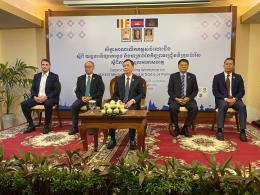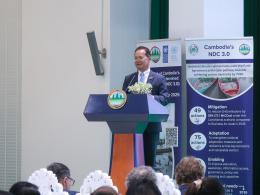 The Cambodia Climate Change Alliance (CCCA) Retreat took place between the 31st May and the 2nd June 2012 in Kampot. The aim of the retreat was to engage key partners in taking stock of the current public expenditure on climate change; exploring different approaches to climate change mainstreaming into national and sector development plans; and technical consultations on strategic climate change coordination. Read on for a summary of key issues and recommendations highlighted in proceedings of thematic areas covered during the CCCA retreat.
The Cambodia Climate Change Alliance (CCCA) Retreat took place between the 31st May and the 2nd June 2012 in Kampot. The aim of the retreat was to engage key partners in taking stock of the current public expenditure on climate change; exploring different approaches to climate change mainstreaming into national and sector development plans; and technical consultations on strategic climate change coordination. Read on for a summary of key issues and recommendations highlighted in proceedings of thematic areas covered during the CCCA retreat.
Key Objective of the Retreat
The aim of the retreat was to discuss tools for mainstreaming climate change, climate change financing and coordination, with the overarching goal of mainstreaming climate change into the upcoming National Strategic Development Plan (NSDP) 2014-2018.
Lessons Learned on Climate Change Mainstreaming
Least Developed Countries are facing major challenges in climate change mainstreaming and budgeting. The session presented Global Climate Change Alliance GCCA tools which can support government in mainstreaming climate change. Participants suggested that clear inputs along with clear budget proposals from line ministries and agencies be required for mainstreaming climate change into NSDP. Ministry of Economy and Finance engagement is key for costing climate change while CSO participation is also important in NSDP process.
Climate Public Expenditure and Institution Review- CPEIR Session:
The CPEIR presentation described the findings covering policy, institutions and expenditure patterns. This shows that expenditure on adaptation and mitigation is dominated by donors and is mostly in development expenditure. It also shows that the dedicated high profile climate projects (i.e. CCCA, PPCR and MRC/CCAI) account for only about 10% of the total climate expenditure across government. The policy and institutional analysis suggests that the current initiatives in policy development are appropriate and that it should be possible to coordinate and manage climate expenditure without creating new institutions. With regard to the baseline of existing expenditures, participants noted the need to outline plans for analysis and dialogue to strengthen baselines which might include household expenditure analysis and private sector analysis. The possible role of an Annual Climate Monitoring Report was raised. Participants discussed the entry points for climate funding and mechanisms for allocating and managing climate funds, including the possible role of CCCA and PPCR as models for dedicated climate funding. There was also a strong discussion on the need for improved coordination within and between government and donors. Finally, there was a discussion on the need to improve methods and guidelines for the classification of climate expenditure. This conclusion was supported by an exercise in which participants each classified a list of projects using the basic CPEIR principles.
Climate Finance Strategy Session
The Climate Finance Strategy (CFS) presentation highlighted that CFS will be an integral part of the Cambodia Climate Change Strategic Plan (CCCSP) and will support the climate change mainstreaming agenda. The central purpose of the CFS is to increase the country absorbing capacity and to effectively utilise funds while delivering results. This strategy can be achieved by better spending existing resources, and mobilising domestic and external resources through a credible and attractive financing mechanism that present a coherent approach. This requires strengthening the capacities to both manage existing resources and mobilise more resources for climate change responses. Resource gaps also exist between existing expenditures and finance required for climate change. Furthermore, government institutions planning for climate change often lack information on resources allocated for climate change by other government institutions, making planning and budgeting difficult. The participants also raised the following issues as pertinent to Climate Finance Strategy: strengthening coordination; partnerships within government, development partners, the civil society and private sector; delivering climate finance to the local level; management of risk and uncertainty; and monitoring results. It was agreed by the participants that the CFS should have the same time frame as the National Strategic Development Plans (NSDP) 2014-2018. It was proposed that a CFS be built on key guiding principles such as use of existing institutions with relevant mandates, credibility and attractiveness (tracking system, M&E, independent audit and evaluation), DP harmonisation (pool fund), alignment with national priorities (country driveness), financial sustainability, predictability, adaptability and flexibility (to accommodate changes), and multi-stakeholders' engagement (public, private, DP, etc.).
Climate Change Mainstreaming Session
In this session, the NSDP and sectoral plans were identified as a key entry point for climate change mainstreaming. It was pointed out however that mainstreaming climate change into sub-national processes tends to be overlooked. Two guiding presentations based on Global Climate Change Alliance (GCCA) and Disaster Risk Reduction (DRR) Approaches were made on how to mainstream climate change. The group exercise to highlight key approaches to climate change showed that climate change mainstreaming is a highly complex process. Nevertheless, three key messages came from the deliberations on climate change mainstreaming: first, successful climate change mainstreaming will have to consider developing clear guidelines for mainstreaming for all sectors and at all levels of governance; secondly, there is need to develop training modules to develop the local capacity in responding to climate change; thirdly, Government institutions need to have a common climate change monitoring framework on budget expenditure.
Coordination Session
Coordination was a recurrent issue throughout retreat sessions and it is clear that coordination in climate change is not only relevant for government structures, but also among climate change initiatives funded by development partners. Two presentations were made under this session: a matrix of the Pilot Programme for Climate Resilience (PPCR) and the CCCA combined results, which brought to the attention of the participants, the overlaps between the two initiatives; and the Climate Change Adaptation Initiative (CCAI) being implemented by the Mekong River Commission. The parallels between the CCCA and PPCR were clear however participants noted that it might be ambitious and complicated for the two initiatives to have a joint work plan, instead key coordination priorities for the next 6/12 months should be identified. It was agreed that Government (MoE) should take a leading role in climate change coordination and reign in other key climate change players such as JICA, AusAID, USAID, etc. MoE should also develop concrete coordination actions- for example donor alignment with government work plan could be articulated in CCSP, Government led-monitoring framework; communications commitments; joint tasks- trainings, analysis, common methodologies; common approach to delivering climate finance.
Climate Change Communication and Education
The Climate Change Education and Awareness Strategy (CCEAS) aims to promote knowledge and information for climate change adaptation and mitigation. It has three main objectives:
- Reduce barriers to information – by refining existing structures and developing new ones where needed, such as the creation of a Knowledge and Informtion Platform
- Re-Use information systems by improving a knowledge and information supply chain,
- Recycle Knowledge into Information products and tools for a general population, through participative communication practices and techniques.
With this strategy, the NCCC members can work in harmony to reach out to the various stakeholders and populations. The participants recommended that the implementation of CCEAS should involve civil society and the Ministry of Education, Youth and Sports (MoEYS). It was also noted that Cambodia is amongst the first countries to develop such a strategy which is in line with Article 6 of the UNFCCC.
You can download the presentation on the CCE&AS here:
{phocadownload view=file|id=182|text=CCEAS Brief|target=s}
Next Steps
- Draft Climate Change Mainstreaming Guidelines for sectoral and NSDP Planning processes
- Develop a Climate Change Finance Strategy
- Identify priority coordination areas between CCCA and PPCR
- Hold NCCTT consultations more frequently



